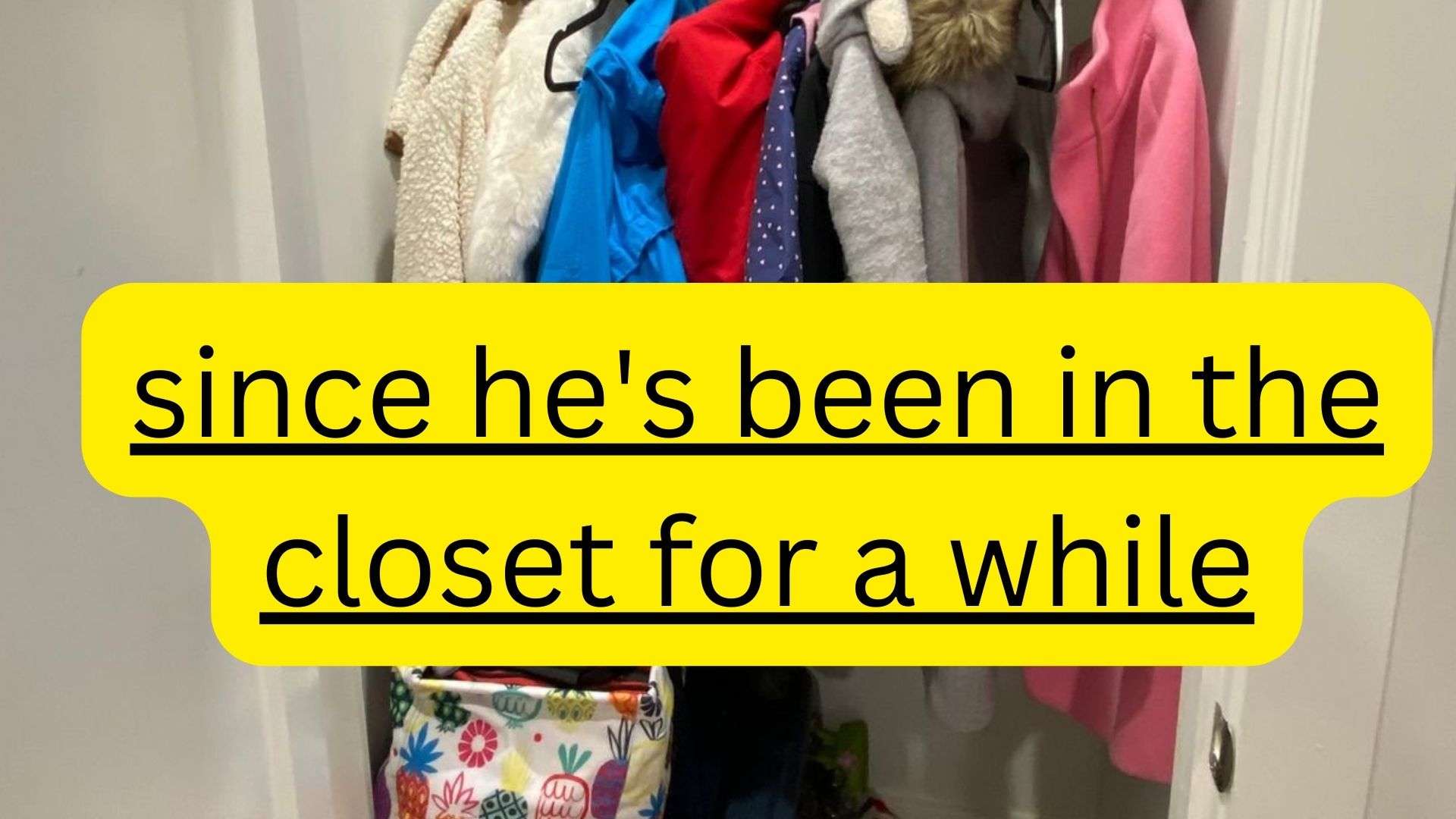Defining the Concept of Being in the Closet
since he’s been in the closet for a while The phrase in the closet often refers to someone hiding a significant part of their identity, most commonly in the context of sexual orientation or gender identity. But it can also refer to a broader range of personal truths, aspects of identity or lifestyle choices, concealed due to fear, societal expectations, or personal struggles. For many, being “in the closet” is not just a secret but a way of navigating a world that might not be ready to accept them as they truly are.
For those who have been in the closet for an extended time, the experience can be uniquely challenging. Years of silence, secrecy, and emotional restraint can shape a person’s inner world and affect their relationships, mental health, and self-image. It’s important to recognize why people stay hidden and what it means to come out, particularly after years of suppressing one’s identity. This journey is one of resilience, fear, courage, and ultimately, self-acceptance.
What does it feel like to live in such secrecy for so long, and what happens when a person finally decides to embrace their authentic self? This article explores the nuances of being “in the closet,” the emotional impact, and the rewarding, albeit challenging, journey of coming out.

Why People Stay in the Closet: Understanding the Pressures and Challenges
Coming out and living openly as one’s true self should be a basic right, yet countless people stay in the closet due to various pressures. These pressures are often deeply embedded in cultural, familial, and social expectations that make authenticity feel risky or even dangerous.
Societal and Cultural Expectations
Society and culture often dictate norms about what is acceptable, creating invisible boundaries that can confine individuals. In some communities, traditional views on gender roles, sexuality, and identity are tightly held, leading to harsh consequences for anyone who deviates from these norms. For example, some cultures may view non-heteronormative relationships as unacceptable, even sinful. Those raised in conservative or religious environments might face explicit teachings against LGBTQ+ identities, leading to feelings of guilt, shame, or fear of divine punishment.
Beyond sexual orientation, there are other aspects of personal identity that societal expectations may push into secrecy. For instance, individuals might feel pressured to hide aspects of their mental health, spiritual beliefs, or even lifestyle choices if they deviate from what is considered “normal.” The weight of cultural expectations can be particularly hard to bear, making the closet feel like a necessary, albeit uncomfortable, place to stay.
Family and Personal Relationships
Often, one of the greatest fears about coming out is the potential impact on family relationships. Family holds an irreplaceable place in our lives, providing love, support, and guidance. However, when an individual knows their identity might conflict with family beliefs, they may fear rejection, disappointment, or even being cut off entirely. This fear is not unfounded; many have lost family connections after revealing their true selves.
Family expectations can influence how we see ourselves and the choices we make. In close-knit families, there can be an unspoken rule to “fit in” and maintain harmony by following traditional paths. When someone knows that coming out may disrupt this harmony, they may choose to stay quiet, preserving their relationships at the cost of their own authenticity.
Personal Fears and Self-Doubt
The fear of judgment and internalized self-doubt are other powerful reasons why people stay in the closet. Growing up in environments where certain aspects of identity are stigmatized can lead individuals to internalize negative views about themselves, resulting in self-doubt and shame. This internalized negativity can make it incredibly difficult for individuals to embrace and express their true selves. They may fear not only external judgment but also question their own worth and validity.
For many, the closet becomes a place of safety, albeit a restrictive one. It shields them from judgment and ridicule but prevents them from truly exploring who they are. Often, this self-doubt manifests as anxiety, depression, or even a sense of alienation from one’s own body and mind.
Living in the Closet: Emotional and Psychological Impact
Being in the closet is not just about hiding from others; it’s also about living a life where self-censorship becomes second nature. Over time, this secrecy can have profound effects on a person’s emotional well-being, mental health, and sense of identity.
Internal Conflict
Living with a hidden identity can feel like living two lives simultaneously: the one presented to the world and the one that remains private. This duality often creates a deep, painful internal conflict. On one hand, there is a desire to be authentic, to live honestly, and to be accepted without conditions. On the other hand, there is fear—the fear of rejection, isolation, and harm. This conflict can lead to a sense of fragmentation, where the person feels like they are never fully “whole.”
Over time, the stress of concealing one’s true self can lead to self-doubt and erode self-esteem. Many people begin to question their worth, feeling as though their true self is something to be hidden rather than celebrated. This tension can manifest in physical and mental health challenges, leading to symptoms of anxiety, depression, and other mental health issues.
Emotional Isolation
One of the hardest parts about being in the closet is the sense of isolation that often accompanies it. Hiding a core aspect of one’s identity means that one’s relationships—no matter how close—can feel incomplete. Friends, family, and even romantic partners may only see a partial version of who the person really is, creating a profound sense of loneliness.
The isolation can be especially difficult in situations where individuals are surrounded by people who openly express their own identities. Watching others be authentic can heighten feelings of loneliness and intensify the longing for self-expression. Over time, the emotional toll of this isolation can become heavy, making the idea of coming out feel like both a relief and a risk.
Identity Suppression
Years spent in the closet can have a significant impact on personal identity development. When one part of the self is consistently suppressed, it’s hard to grow into a fully developed person. For those who have been hiding their true selves, their sense of identity might feel underdeveloped, as though they are missing pieces of who they are.
Suppressing identity is like pressing pause on certain aspects of personal growth. While others are discovering new dimensions of themselves, those in the closet may feel stuck, as though their life has been on hold. This can lead to feelings of resentment, frustration, and a sense that they have missed out on important life experiences.
Mental Health Consequences
The psychological impact of long-term secrecy is significant. Many individuals in the closet struggle with heightened levels of anxiety and depression, stemming from the constant need to hide and self-censor. This anxiety may be triggered by fear of being “found out,” leading to hyper-vigilance and stress.
The mental health consequences of living in the closet are well-documented in LGBTQ+ communities, with studies showing increased rates of depression, anxiety, and suicidal thoughts among those who feel compelled to hide their identities. The impact of long-term secrecy should not be underestimated, as it affects not only the individual’s well-being but also their ability to engage fully in relationships, work, and daily life.
Breaking Out: What It Means to Come Out After a Long Time
For those who have been in the closet for years, coming out is both a brave and daunting step. After a long period of secrecy, revealing one’s true self can feel like stepping into the light for the first time.
Courage and Vulnerability
Coming out after years of hiding requires immense courage. It means facing the fears, insecurities, and societal pressures that initially drove the individual into the closet. This process is deeply vulnerable, as the person is often revealing a part of themselves that has been protected, guarded, and perhaps even wounded by years of concealment.
There is an intense vulnerability in revealing one’s true self, particularly when that self has been hidden for so long. This vulnerability is often accompanied by a sense of freedom, as though a weight has been lifted. Finally, the individual can live authentically, without the constant fear of hiding.
Reactions and Responses
One of the biggest uncertainties in coming out is how others will react. Responses from friends, family, and colleagues can range from acceptance and support to confusion, disappointment, or rejection. For those who come out later in life, reactions can be particularly complicated. Family members or long-time friends might feel as though they have been “kept in the dark,” while others might struggle to understand why the person stayed hidden for so long.
However, many find that coming out brings unexpected support. People who genuinely care may be surprised, but they are often willing to listen, understand, and support the individual on their journey. These positive responses can be transformative, fostering new levels of connection and trust in relationships.
Rediscovering Identity
After coming out, many individuals embark on a journey of self-discovery. They begin to explore parts of their identity that were previously hidden or underdeveloped. This process might include connecting with LGBTQ+ communities, exploring new interests, or engaging with activism.
Rediscovering identity can be both exhilarating and overwhelming. For those who have been hiding for years, there is often a sense of catching up on lost time. They may seek out new communities, form new friendships, and explore aspects of themselves that they were unable to acknowledge in the past.
Challenges and Rewards
Coming out after a long period in the closet is not without its challenges. Some may struggle with feelings of regret over the time they spent hiding. Others may encounter resistance from family members or social circles who have difficulty accepting their newfound openness. However, the rewards of living authentically usually outweigh the challenges.
Living openly can foster a sense of empowerment and confidence. Finally, individuals can express themselves fully, without fear or hesitation. The freedom to be authentic can enhance self-esteem, improve mental health, and open doors to meaningful relationships and opportunities that were previously inaccessible.
Navigating Relationships and Social Spaces Post-Closet
Once someone comes out, they often find that their relationships and social experiences change in significant ways. Coming out impacts every aspect of one’s social world, from family connections to friendships and even professional relationships.
Family Dynamics
In some families, coming out leads to positive change, fostering deeper understanding and respect. In others, it can create tension or conflict, particularly in families that hold conservative views. Navigating family dynamics post-coming out requires patience, open communication, and sometimes, the willingness to set boundaries.
For those who receive acceptance from their families, the experience can be deeply healing, bringing a new level of intimacy and authenticity to family relationships. However, when families struggle to accept the individual’s identity, it’s important for the person to seek support elsewhere, recognizing that family acceptance, while ideal, is not the only source of support.
Friendships and Social Circles
Friendships can also undergo a transformation. Some friends may be shocked or need time to adjust, while others may be immediately supportive. Coming out can help individuals identify which friends truly accept and value them for who they are. Often, it leads to deeper and more genuine friendships, as the individual no longer feels the need to censor themselves around friends.
For some, coming out means reevaluating social circles and seeking new friendships with people who share similar values or experiences. LGBTQ+ communities, for example, can offer a sense of belonging and understanding that might be difficult to find elsewhere.
Building New Connections
After coming out, many individuals feel empowered to seek out connections that celebrate and affirm their identity. Whether through support groups, online communities, or social events, building new connections can provide a vital source of support, helping individuals embrace their true selves.
Tips for Allies
For friends, family, and colleagues, supporting someone who has recently come out is essential. Allies can help by offering acceptance, listening without judgment, and respecting the individual’s journey. Simple acts of validation, like using preferred pronouns and avoiding invasive questions, can go a long way in building trust and showing support.
Finding Healing and Self-Acceptance
Coming out is a powerful step toward self-acceptance, but healing from years of hiding can be a longer journey. It requires patience, self-compassion, and sometimes, external support.
Embracing Authenticity
Living authentically allows individuals to experience life fully, without the constraints of secrecy. They can finally express their likes, dislikes, interests, and beliefs openly, forming a more cohesive sense of self. Embracing authenticity often leads to new hobbies, creative pursuits, and a sense of joy in life that was previously inaccessible.
Mental Health Support
For many, therapy or counseling can be an important part of healing from years spent in the closet. Mental health professionals can help individuals process the emotional impact of their experiences, providing tools for coping with anxiety, self-doubt, and other mental health challenges.
Support groups, whether in-person or online, can also provide a space for individuals to share their stories, receive validation, and connect with others who have faced similar journeys.
Celebrating Identity
Self-acceptance often means celebrating one’s identity in ways that were previously impossible. From attending pride events to engaging with LGBTQ+ art, literature, and activism, there are countless ways to honor one’s identity and feel a sense of community.
Long-term Growth
The journey from the closet to full self-acceptance is one of personal growth. Living authentically fosters resilience, confidence, and a deep sense of self-worth. Many individuals find that they are stronger and more self-assured after coming out, ready to face life’s challenges with newfound courage and self-belief.
Conclusion: Embracing the Journey — The Path from Fear to Freedom
Coming out after years in the closet is a transformative journey that requires courage, vulnerability, and resilience. Those who take this step often find a sense of freedom that allows them to live fully, forming genuine connections and embracing their true selves.since he’s been in the closet for a while
For anyone who has been in the closet for a while, remember that it’s never too late to start living authentically. Each person’s journey is unique, and there is no “right” time to come out. The important thing is to honor your own process, celebrate your courage, and embrace the joy that comes with finally living as your true self.















Leave a Reply